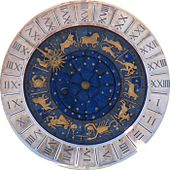Financial astrology
This article may require cleanup to meet Wikipedia's quality standards. The specific problem is: Needs to be properly contextualized in terms of WP:FRINGE and History/Criticism peculiarly focuses entirely on the years around the turn of the millennium. (June 2020) |
| Astrology |
|---|
 |
| Background |
| Traditions |
| Branches |
| Astrological signs |
| Symbols |
Financial astrology (also known as business astrology, economic astrology, and/or astro-economics) is a pseudoscientific practice of relating the movements of celestial bodies to events in financial markets. The use of astrology in any context is not empirically based and its use in predicting financial markets is at plain odds with standard economic and financial theory.
As with astrology in general, predictions are vague and hard dates are rarely given. Critics have pointed out that some astrological events that have been used in predictions occur so rarely that they may have never happened before within a human lifetime, thus having no precedent on which to predict results.[1]
History
[edit]In 1992, 1994, and 2008, a magazine by the name of Wall Street Forecaster was named as one of the top forecasters on Wall Street, as the superstition was being leaned on for luck.[2] It was also rated the second best performing forecaster in 2002.[2] It was reported that some clients asked for their copies to be delivered in 'brown paper' to avoid mockery [citation needed]. As of 2001, the Astro fund trading company, which handled $3.5-5 million worth of investor assets, claimed 10-15% of fund managers were using their service or a similar company.[3] The majority of the market demand for this service has come from the US and Japan respectively.[4] In 2000, Bloomberg News was host to a weekly show dedicated to financial astrology.[4] The 2000 financial crash led to a surge in companies and investment bankers using the services of financial astrologers.[5][6]
Criticism
[edit]Large financial firms tend to ignore financial astrology. The practice was used by Goldman Sachs in a paper released in 1999, focusing specifically on the correlation between eclipses and the state of the financial market at that time[citation needed]. Though floated as an idea by the company at the time, analysis showed that random data produced similar results.[7]
See also
[edit]References
[edit]- ^ Inthirarajah, Arul (August 15, 1992). "How to read the planets". Business Times. Singapore.
- ^ a b Storr, Will (December 1, 2013). "Could the stars predict the markets?; The position of the planets doesn't make a share price plummet. Or does it? This is what 'financial astrologers' claim -- and many traders believe them, finds Will Storr". The Sunday Telegraph. London. pp. 14–15.
- ^ "Managers Turn in to Horoscope Know-How; Wall Street Stars: Astrologers Forecast a Heavenly Return". Birmingham Post. March 17, 2001. p. 28.
- ^ a b Lee, Sandra (August 5, 2000). "Star advice for kooky investors". The Daily Telegraph. Sydney, Australia. p. 33.
- ^ Jarvis, David (February 8, 2009). "The stars rescue our banks". Sunday Express. p. 21.
- ^ Krantz, Matt (May 26, 2000). "Stars above! Some investors seeking astrological guidance -- really". USA Today. p. 1B.
- ^ Bulsara, Hament (March 18, 2001). "If Crystal Ball is Cloudy, Just Turn to the Stars". The Toronto Star.
